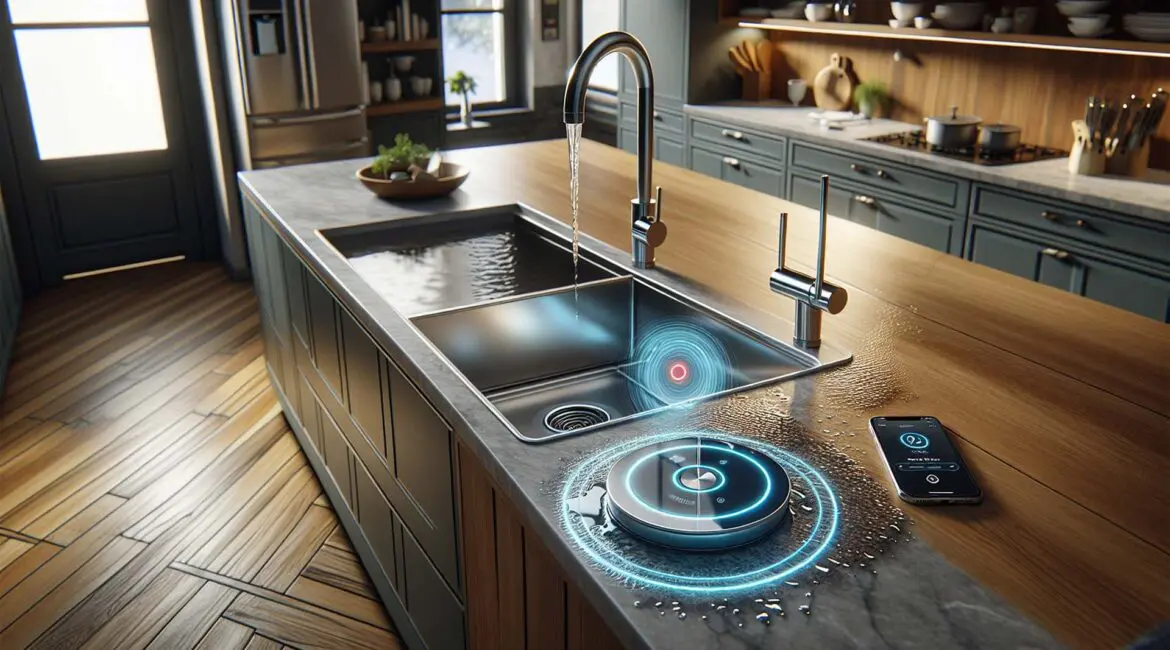Water damage can be a homeowner’s worst nightmare, causing costly repairs and disrupting daily life. Enter smart water leak detectors, a revolutionary technology that’s changing the game in plumbing and home maintenance. These innovative devices use advanced sensors and smart home technology to detect leaks early, prevent floods, and save homeowners from potential disasters.
Smart water leak detectors offer a range of benefits, from remote monitoring to smartphone notifications, giving homeowners peace of mind and control over their plumbing systems. This article will explore how these devices work, their key features, and the cost savings they provide.
We’ll also discuss how to choose the right smart water sensor for your home, ensuring you have the best protection against water damage. By the end, you’ll understand why smart water leak detection systems are becoming an essential part of modern home maintenance.
Table of Contents
- Understanding Smart Water Leak Detectors
- Benefits of Smart Water Leak Detection
- Key Features of Smart Water Leak Detectors
- Choosing the Right Smart Water Leak Detector
- Final Thoughts
Understanding Smart Water Leak Detectors
What Are Smart Water Leak Detectors?
Smart water leak detectors are sophisticated devices designed to identify and alert homeowners to the presence of water or moisture in areas where it shouldn’t be. These innovative tools are equipped with advanced sensors and often connect to a network or smartphone app. When they detect water or excess moisture, they can send immediate notifications to connected devices, allowing for quick responses to potential leaks or flooding.
How Do They Work?
Smart water leak detectors utilize various technologies to sense moisture. Common sensing mechanisms include:
- Conductive Sensors: Use two probes that complete an electrical circuit when water bridges the gap.
- Capillary-based Sensors: Rely on materials that absorb water and trigger an alert when wet.
- Optical Sensors: Detect changes in light transmission or reflection caused by water.
- Ultrasonic Sensors: Emit sound waves and measure their return time to detect water presence.
- Magnetic Sensors: Detect changes in the magnetic field caused by water or moisture.
When a sensor detects water, it activates an alert mechanism. This can include audible alarms, visual indicators like LED lights, or notifications sent to smartphones via a mobile app.
Types of Smart Water Leak Detectors
- Basic Battery-operated Sensors: Simple disk-shaped devices placed on the floor near potential leak sources.
- Sensors with Extension Cables: Offer expanded coverage with flexible, sensor-equipped cables.
- In-line Systems: Monitor the entire water delivery system, learning usage patterns and detecting abnormalities.
- Environmental Monitors: Also track temperature and humidity levels to prevent frozen pipes and high humidity issues.
These devices range in complexity and features, with some offering integration with smart home systems for automated responses like shutting off water valves.
Benefits of Smart Water Leak Detection
Early Leak Detection
Smart water leak detectors offer homeowners a powerful tool to discover water-leak issues before they become disasters. These devices constantly monitor areas prone to leaks, detecting even the smallest puddles upon contact.
With sensors that can identify as little as 0.4 mm of water, they provide fast and efficient detection. When a leak is detected, the system promptly sends alerts to homeowners via smartphone notifications, enabling swift action to prevent damage.
Water Conservation
Smart leak detection systems play a crucial role in water conservation efforts. According to the EPA, household leaks waste more than 1 trillion gallons of water annually in the U.S. alone. By monitoring water usage and flow rates in real-time, these systems can quickly catch bill-hiking leaks. This capability helps homeowners slash water bills and contribute to overall water conservation.
Cost Savings
The financial benefits of smart water leak detectors are significant. Water damage ranks among the most common insurance claims, comprising 24% of all claims. The average repair cost for water damage in a home is around CAD $15,000. In contrast, a smart leak detection system costs under CAD $300. By preventing just one instance of water damage, these devices could save homeowners as much as CAD $14,000 or more.
Improved Safety
Beyond financial savings, smart water leak detectors enhance home safety. They safeguard health by inhibiting mold growth, which often accompanies unaddressed leaks. Many systems also monitor temperature and humidity, alerting users to conditions that could lead to frozen pipes or high humidity-related issues. This comprehensive approach to home protection provides homeowners with peace of mind, knowing their property is safeguarded against water-related risks.
Key Features of Smart Water Leak Detectors
Real-time Alerts
Smart water leak detectors offer immediate notifications when they detect moisture. These devices use advanced sensors to identify even small amounts of water, as little as 0.4 mm. When a leak is detected, the system promptly sends alerts to homeowners via smartphone notifications, enabling swift action to prevent damage. Some detectors also feature audible alarms and visual indicators like LED lights for on-site awareness.
Remote Monitoring
The remote nature of smart leak detection systems makes them ideal for landlords, property managers, and owners of vacation homes. Through mobile apps or web browsers, users can monitor water flow rates, pressure, and temperature in real-time. This constant vigilance ensures that even the slightest irregularities are promptly identified and addressed, preventing potential damages and minimizing water waste.
Integration with Smart Home Systems
Many smart water leak detectors are compatible with popular smart home platforms like Alexa, Google Assistant, and IFTTT. This integration allows users to control the devices using voice commands and create automated responses to leaks. For example, some systems can automatically shut off the main water supply if they detect a significant leak, preventing small issues from turning into major floods.
Easy Installation
While some high-end systems require professional installation, many smart water leak detectors are designed for easy DIY setup. Basic models are battery-operated disks or small boxes that simply sit on the floor in leak-prone areas.
More advanced systems may need to be installed near the water meter or integrated into the home’s plumbing system. Regardless of the type, most detectors can be quickly set up and connected to a home’s Wi-Fi network for immediate protection against water damage.
Choosing the Right Smart Water Leak Detector
Factors to Consider
When selecting a smart water leak detector, homeowners should keep several key factors in mind. Connectivity is crucial, with options ranging from Bluetooth-only devices to those that use Wi-Fi for remote monitoring. For comprehensive protection, look for detectors that offer environmental monitoring, including temperature and humidity sensors. These features can alert homeowners to conditions that might lead to burst pipes or mold growth.
Another important consideration is the detector’s power source. Battery-operated devices offer flexibility in placement, while plug-in models eliminate the need for battery changes. The alert system is also vital, with options including smartphone notifications, emails, texts, and built-in sirens.
Top Brands in the Market
Several reputable brands offer reliable smart water leak detectors. The Guardian by Elexa Leak Prevention System is a well-rated option, priced at around CAD $485.80. For those seeking an affordable solution, the BAZZ Smart Water Leak Sensor provides reliable monitoring without requiring a hub. It operates on a single CR2 lithium battery and includes an internal siren and mobile notifications.
For whole-home protection, consider in-line systems that monitor your entire water delivery system. These advanced devices can track water usage patterns, detect abnormalities, and even automatically shut off the water supply if a serious problem is detected.
Installation Tips
Installing a smart water leak detector can be a straightforward process, especially for basic models. Place sensors in areas prone to leaks, such as under sinks, behind toilets, and near appliances like refrigerators and washing machines. For more comprehensive coverage, use multiple sensors or opt for models with extension cables.
For in-line systems, professional installation is often required. These devices typically need to be placed near the water meter and integrated into your home’s plumbing system. Ensure your pipes are compatible with the chosen system, typically requiring half-inch to 1-inch wide pipes with a quarter-turn ball shutoff valve and adequate space around it.
Final Thoughts
Smart water leak detectors are causing a revolution in home maintenance, offering homeowners a powerful tool to protect their properties from water damage. These devices provide early leak detection, water conservation, and significant cost savings, making them an essential addition to any modern home. By leveraging advanced technology and smart home integration, they give homeowners peace of mind and control over their plumbing systems.
As we look to the future, the adoption of smart water leak detectors is likely to grow, driven by their ability to prevent costly damage and contribute to water conservation efforts. Homeowners should consider investing in these devices to safeguard their properties and potentially save thousands in repair costs. With a range of options available in the market, from basic sensors to whole-home systems, there’s a solution to fit every need and budget.





